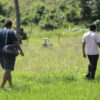I was born and brought up in a city so as far as I was concerned, my food source was the vegetable seller who came by my house or the aisles of identical produce on the shelves at the supermarket. We used to visit my native village in Kerala every other summer holiday and the one takeaway that I remember to this day how good the food tasted!
The dishes was the same, the recipes were the same but the difference was really in the ingredients. Let’s back up here for a moment.
I am from a small village in Kerala called Mararikulam. This was the village where my grandmother grew up and I remember having conversations with her about the vegetables in the village and she told me that in her childhood, she had never seen tomatoes or potatoes being used in the kitchen. There were a few vendors who used to sell them in the big bazaar but nobody really knew what to do with them. This is because these along with a host of other modern kitchen staples are not native to the region.
People ate what was grown locally and a lot of it was actually grown in the house. There was no concept of chemical pesticides or fertilizers. Kitchen waste was composted in the backyard and used as fertilizer for the plants. Ash from the kitchen wood-fired stoves was used as natural pesticides. The reason why this sufficed was because most of the crops that were grown in kitchen gardens were native to the region and hence had a natural resistance to most pests and microbial diseases. After living their entire lives eating all this naturally grown food, it is no wonder that people from my village tend to live till at least a hundred years old.
So where did things really begin to change? My grandparents settled in Delhi in the early 70’s back when Delhi was not the metropolis behemoth that it is today. Rapid unplanned expansion, massive population explosion and consequently a massive demand for food is what lead us here today. This is not just the story of Delhi, but of every major metropolis in the world. It’s just not possible to grow that scale of fresh vegetables without compromising on how it is grown.
Chemical pesticides and fertilisers became the norm and we got complacent. Why? Because the convenience of fresh vegetables in our supermarket goes perfectly with our fast-paced lifestyles. But at what point do we stop and question whether we’re living our lives the way we want or slowly poisoning ourselves with our diet. And I will admit, I am equally guilty. Eating clean seems to require a bit more effort but now that I’ve made the switch, I realise that the effort was more of a mental block.
Now that I made the switch, I realise what I’ve been missing. The food tastes better the salads are fresher and I feel a lot healthier. As a consequence of getting all this lovely produce, I have started cooking at home more often and stopped eating from outside as much as I used to. Making the switch to clean eating changed my life in ways that I hadn’t even thought it would. Kicking the complacency was easy. My only concern was being able to find an adequate supply of food that my Farmizen subscription has easily fulfilled.
Make the switch – kick the complacency and you’ll see that there is no going back.


Comment